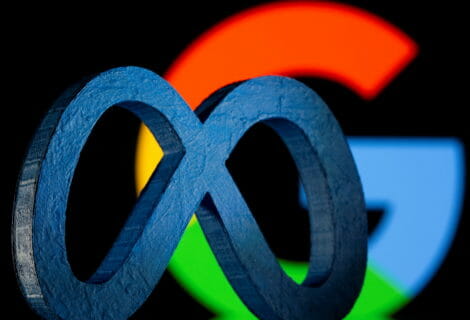
FILE PHOTO: A 3D printed Facebook’s new rebrand logo Meta is seen in front of the displayed Google logo in this illustration taken on November 2, 2021. REUTERS/Dado Ruvic/Illustration
MANILA, Philippines — Social media company Meta has assured Filipinos that it is preparing platforms against a possible deluge of misinformation, hate speech, and other harmful content as the May 2022 general elections near.
In a press briefing on Thursday, Aidan Hoy of Meta’s Strategic Response in the Asia Pacific Region and Facebook Philippines Head of Public Policy Clare Amador addressed concerns about the platforms like Facebook and Instagram being used to spread misinformation and other inauthentic and dangerous activities, saying that they have partnered with several government offices and civil society organizations to watch out for these events.
“Our goal is to make it harder for people to interfere with elections on our family of apps — that is Facebook, Instagram, and Whatsapp, but also we wanna make it easier for people to have their voices heard,” Hoy told Manila-based reporters in an online meeting.
“Elections have changed a lot over the past few years, but so has Meta. We know we have an important responsibility when it comes to helping people participate in elections, as well as mitigating the election-triggered risks. We now do, more than ever, to stop election interference, using lessons from the past as well as inputs from experts and policy makers across the political spectrum,” he added.
Among the safeguards, Meta has introduced are tools to ensure that political advertisements on their platform really originate from the Philippines, to ensure that no foreign interference occurs. What happens, Hoy said, is that they now require advertisers to confirm their identities and location, and fill up a disclaimer sheet which would then provide users with more information about their background.
“So in 2020 we introduced tools in the Philippines to make political advertising much more authentic. These tools compel advertisers who are looking to launch ads about politics in the Philippines to first have to confirm their identity, confirm their location, and finally fill up a disclaimer for their advertisement,” Hoy explained.
“To run these ads, the advertiser must have a valid form of Philippine identification, which mitigates foreign interference. So this means that when people are scrolling through their news feed, they see a political ad, they see a paid-for by a disclaimer on that ad, which when they click through would provide more information about the people behind that particular advertisement,” he added.
All of these measures are being implemented, and have been extended to a wider range of advertisements that may not be political in nature, but may be related to the elections — like social issues that carry a huge influence during polls.
The assurance from Meta comes as the election season in the country enters its last month, with the campaign heating up. Among Meta’s local partners include the Commission on Elections (Comelec), the body assigned to monitor the country’s polls.
Aside from the measures initiated to ensure that users get accurate details from authorities, Facebook Philippines, Amador said, will launch a pop-up notification on election day that would direct people to verified Comelec information.
“We expanded Digital Tayo, this is our flagship digital literacy program in the Philippines to include new modules on civic education and media literacy, focusing on community engagement and empowerment in preparation for the elections. We also launched an incubator for news organizations across the country for elections-related advocacy […] to encourage youth participation through voter engagement advocacy campaigns,” Amador said.
“On election day, we will run a reminder that directs users to official Comelec information, and allows them to share with friends that they have quoted,” she added.
The 2022 national elections is currently heating up, with several camps of presidential candidates claiming that they have been victimized by “fake news” or misleading information.
In the past, Vice President Leni Robredo who is seeking the presidency has cited reports that she has been the biggest target of misinformation campaigns, while her opponent, former senator Bongbong Marcos was the biggest gainer of misleading news.
READ: Robredo is biggest disinformation victim; Marcos gains from ‘misleading’ posts — fact-checker
READ: Robredo: Disinformation, fake news still biggest challenge to presidential bid
Marcos however contradicted these claims, saying that he too is a victim of widespread disinformation drives.
READ: Bongbong Marcos: I am the victim of fake news
READ: Marcos Jr. winning PH poll misinformation drive – analysis